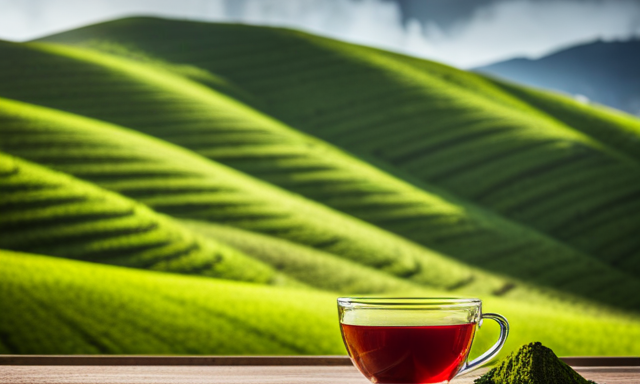Hey there, tea enthusiasts! Let me spill the tea on rooibos – a delightful beverage that’s been quenching thirsts for centuries. If you’re wondering how to properly enjoy this South African gem, you’ve come to the right place.
First things first, let’s travel back in time to the origins of rooibos tea. Picture this: the sun-kissed slopes of the Cederberg Mountains, where the rooibos plant, scientifically known as Aspalathus linearis, flourishes. Indigenous to this region, the locals have been savoring its unique flavors and health benefits for generations.
Now, let’s fast forward to the present, where I’m here to guide you through the art of drinking rooibos tea. From steeping techniques to pairing suggestions, I’ll be your go-to source for all things rooibos.
So grab your favorite mug, settle in, and let’s dive into the wonderful world of rooibos tea and how to drink it like a pro.
Get ready to sip your way to pure bliss!
Key Takeaways
- Rooibos tea is a caffeine-free alternative to traditional tea or coffee.
- It is naturally sweet and can be enjoyed without additional sweeteners.
- Rooibos tea has numerous health benefits, including being rich in antioxidants and minerals.
- It is a versatile beverage that can be enjoyed hot, iced, or as a base for cocktails.
Origins and History of Rooibos Tea
If you really want to appreciate the rich flavors and heritage of rooibos tea, you should delve into its fascinating origins and history.
Rooibos tea, also known as red bush tea, is native to South Africa, specifically the Cederberg region. The indigenous people of this area, the Khoisans, have been using rooibos for centuries as a medicinal herb.
It was only in the early 20th century that rooibos tea gained popularity outside of Africa. Benjamin Ginsberg, a Russian immigrant, recognized the potential of rooibos and began commercializing it.
Since then, rooibos tea has become a beloved beverage worldwide, known for its smooth, sweet flavor and numerous health benefits. Its long history and cultural significance make rooibos tea not just a delicious drink, but a window into the rich heritage of South Africa.
Frequently Asked Questions
Is rooibos tea effective for weight loss?
Rooibos tea is not a magic weight loss solution, but it can support a healthy lifestyle. Its health benefits include boosting metabolism and aiding digestion. Remember, weight loss requires a balanced diet and regular exercise.
Can rooibos tea be consumed by pregnant women?
During pregnancy, rooibos tea can be consumed as it offers several benefits. It is caffeine-free, rich in antioxidants, and may relieve common pregnancy discomforts. However, excessive intake should be avoided due to potential risks.
Does rooibos tea contain caffeine?
Rooibos tea does not contain caffeine, making it a great alternative to green tea. It has numerous health benefits, including being rich in antioxidants and promoting heart health.
How long should rooibos tea be steeped for optimal flavor?
For optimal flavor, steep rooibos tea for 5-7 minutes. This allows the flavors to fully develop without becoming bitter. Rooibos tea is not only caffeine-free, but it also offers numerous health benefits, such as promoting digestion and boosting the immune system.
Can rooibos tea help with sleep disorders?
Yes, rooibos tea can help with sleep disorders. It is known for its stress-relieving properties, which can promote better sleep. Additionally, it supports heart health by reducing inflammation and improving blood circulation.
Conclusion
In conclusion, after delving into the origins and history of Rooibos tea, it’s clear that this exquisite beverage is a true gem. Just like the sun’s gentle caress on a summer’s day, the rich and velvety taste of Rooibos tea envelops your senses, leaving you feeling rejuvenated and satisfied.
With its countless health benefits and captivating flavor, it’s no wonder that Rooibos tea has gained popularity worldwide. So, go ahead, indulge in a cup of this heavenly elixir and let its warmth embrace your soul.










